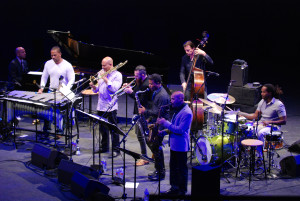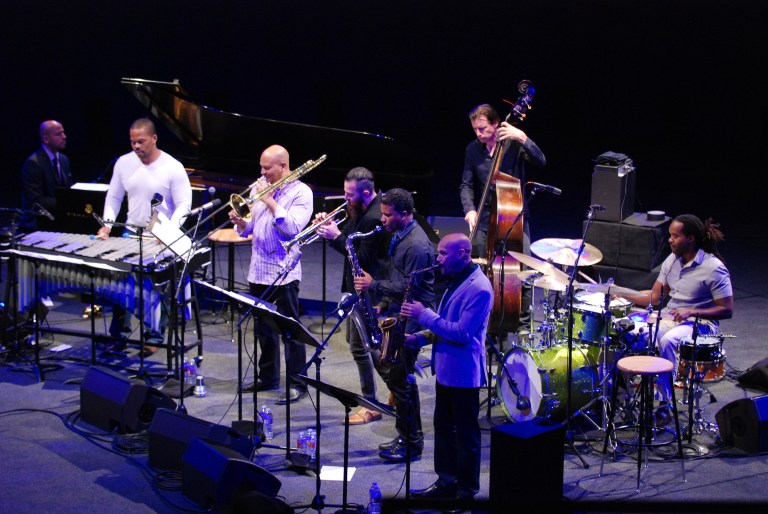Each spring, the eight-piece SFJAZZ Collective assembles for its annual residency in San Francisco. Throughout the season they host a series of workshops and rehearsals, focusing on the music and style of one jazz master, before hitting the road to share the final product on tour. This year, in tribute to saxophonist Joe Henderson, the Collective arranged a series of the late jazz legend’s compositions and crafted an original body of work written in his style. On Wednesday night, for the penultimate show of this season’s tour, the octet performed at Bing Concert Hall.

The Collective is stacked with talent, and although the lineup changes from year to year, fans of modern jazz will undoubtedly find familiar faces. The current rotation features Miguel Zenón on alto saxophone, David Sánchez on tenor, Avishai Cohen on trumpet, Robin Eubanks on trombone, Warren Wolf on vibes, Edward Simon on piano, Matt Penman on bass and Obed Calvaire behind the drums. The Collective has always attracted up-and-coming talent and big names, and past members have included stars like drummers Brian Blade and Eric Harland and saxophonists Joshua Redman and Joe Lovano.
Joe Henderson’s compositional style — on full display Wednesday night — is defined by sophisticated harmony, hard swing and ample use of Latin and Afro-Cuban rhythms in the bass and drums. The Collective’s set selection was a bit uncreative, though, and of the nine songs performed, most had a similar relaxed, ambient feel and suffered from an apparent lack of energy from the band members. You’d think that with the liberty to choose freely from Henderson’s vast and expansive repertoire, the octet could have changed the mood more often. Even the originals, performed between classics, often seemed to be more of the same.
The octet suffered from its awkward size, walking the line between big band and combo but not truly committing to either. If anything, given the heavily-arranged nature of the pieces, the performance leaned more toward a big band sound: The coordination of horns gave more sonic depth and color to the melodies and backgrounds, and the planned nature of the charts meant the music was always going somewhere definitive.
But the price of rigid organization is the loss of spontaneity. In big groups, risks are more costly to the band and the payoffs have less impact, resulting in a more controlled sound. In small groups with talent of this caliber, the musicians feed off each other’s energy, communicate openly and take leaps of faith that make jazz exciting. None of that seemed to be happening on Wednesday, and each player’s contributions felt isolated and at times contrived. Overall, the group really didn’t sound like much more than the sum of its parts.
It wasn’t until the end of their set that the band seemed to wake up. The group truly came together to deliver the reflective ballad “Absolvence,” written by Calvaire to ask forgiveness from the mother of his child after a difficult split. Opening with a solemn bass and piano vamp, the tune crescendoed into a dramatic, and somewhat triumphant, climax, with busy horn lines and driving energy from the rhythm section. Another highlight of the evening was the closer, Henderson’s up-tempo “Jinrikisha,” arranged by Wolf and featuring Calvaire’s fast-paced drum work. Like many of the night’s pieces, the melody and bridge were shared between horns, with unison lines providing power and four-bar trades adding diversity of ideas and voices. Unlike earlier efforts, this piece possessed ample energy, in part due to Cohen’s dizzying solo trumpet runs, Wolf’s flurry of deft mallet strikes and restrained blues style, and a sophisticated, hip-hop inspired drum solo from Calvaire, but really thanks to a long overdue sense of synergy in the band.
Toward the beginning of the evening, Sánchez took the mic and, between introductions and mentions of gratitude, cheekily noted that for the band, the SFJAZZ residency was “the closest we’ll get to a real job” as jazz musicians. He was joking, of course, but it’s still a revealing statement. After all, the concept — a commissioned series of arrangements and originals — doesn’t lend itself easily to creativity, and coupled with a large group, isn’t exactly a recipe for success, either. Unfortunately, in the end, the Collective’s music really did sound like work, not play.
You can contact Benjamin Sorensen at bcsoren ‘at’ stanford.edu.
